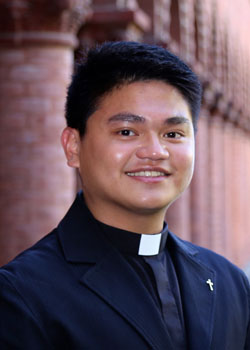- Clergy Corner
Destroying The Condom Culture
by Fr. Joshua Sia
One of my little pleasures in my free time is reading random articles in the internet, particularly articles on well-known news websites such as The Huffington Post, The New York Times, or Business Insider. As one can imagine, there are a lot of different articles that you can read in these websites, but every so often I stumble upon an interesting article or two about our current society, the Catholic Church, and sexuality. I remember reading an article entitled “How the Condom Culture Is Killing Sex” by Rabbi Shmuley Boteach in the Huffington Post.1 I think the Rabbi summarizes well our society’s view on sexuality today, but also our society’s overall moral standards. It is a condom-kind of mentality–a use it and throw it away culture.
The article by Rabbi Boteach goes on to argue how the culture today that promotes recreational sex is causing the death of a healthy view of sex in our time. Immediately, I thought of Paul VI’s Encyclical Letter, Humanae Vitae, when I read the article. Of course, Rabbi Boteach did not go in the same depth Paul VI did in defense of the conjugal act in marriage and I would disagree with him about some points in his article, but I still agree that there is essentially something wrong with a culture that “teach[es] young people to avoid having sex because children, at any age, are the ultimate nuisance.”2 Artificial birth control methods do exactly this. Essentially, birth control takes away the procreative aspect in the conjugal act of spouses. It promotes that children are a nuisance to have, and so partners do everything in their power to avoid this nuisance. If the birth control fails and a child is formed, unfortunately some choose to terminate this life, because some deem it a “nuisance.” If it is no longer useful, or it is a nuisance, then throw it away.
Perhaps a good number of us within the Catholic Church can proudly admit that the wisdom imparted to us by Paul VI in Humanae Vitae is prophetic in more ways than one. In the letter, he tells us that justifying the use of artificial means of birth control can pave the way to marital infidelity as well as making a man reduce a woman to “a mere instrument for the satisfaction of his own desires.”3 Although, perhaps what is most interesting to me is that Paul VI connected the use of artificial birth control and the above mentioned consequences to a “general lowering of moral standards”4 in society. Looking at our society today, I think this statement holds true.
Marital infidelity, treating women as objects, and the overall lowering of society’s moral standards are all issues that, I believe, we are all familiar with today. The country’s divorce rate is at an all-time high and 17 percent of these divorces are caused by infidelity. Many of our adolescents and young adults are into porn, and are sexually active. The value of life is, I believe, at an unbelievably low priority in the overall strata of society. The cause for immediate gratification–materialism, one night stands, and illegal drugs–seem to be stronger than ever. I think I do not need to say more, but I think we can see how all of these are an escape from responsibility, commitment, and love. The law, instead of promoting these values, would rather promote the opposite. Again these are classic examples of a mentality of “if it is not profitable to me, then throw it away.”
So, as Christians, what do we do? I do not mean to paint a dark and depressing picture of our society today and I think it is very important that we always look to the victory of Christ over death, the Resurrection. I think all we can do as Christians is to imitate the love that Christ has shown us and share it to the world. We must also be genuinely convinced of what the Church is trying to accomplish and Humanae Vitae tells us that “the Church is convinced that she is contributing to the creation of a truly human civilization.”5 This human civilization that we strive for is not ruled by a condom-mentality, but rather a civilization ruled with love and sacrifice.
If we are to hope to destroy this condom culture, then we must respond to Christ’s call to discipleship. The call to discipleship is, I believe, a call to love. Love or charity demands a sacrifice in which we are to share a part of ourselves. The essence of love or charity requires that it go beyond itself–it needs to reach out to the other. As Christians and followers of Christ, we are not only called to sharing a part of ourselves, but rather we are called to perfect love in which we dedicate our whole being to charity. It is also within the essence of love that we see the answer to Jesus’ words that “for whoever wishes to save his life will lose it.” To love perfectly is to share ourselves fully, and so in this process of loving perfectly our lives are also lost. In this sense, love always entails sacrifice, for love always involve losing a part of ourselves. And so, as Christians, we treasure all of our relationships, all life and their inherent dignity, we value the sexual dimensions of union and procreation, and do not view them as things to be thrown away. As Christians, we simply love.
1 http://www.huffingtonpost.com/rabbi-shmuley-boteach/how-the-condom-culture-is_b_758432.html
2 Ibid.
3 Humanae Vitae 17
4 Ibid.
5 Humanae Vitae 18
About The Author


